Analyzing Sustainable Operations Management at Tesco
VerifiedAdded on 2023/06/14
|15
|5674
|388
Report
AI Summary
This report explores sustainable operations management, using Tesco as a case study to illustrate key concepts and practices. It delves into the relevance of sustainability for businesses, emphasizing the importance of balancing societal, environmental, and economic considerations. The study examines the three main dimensions of sustainability—environmental, social, and economic—and how Tesco implements practices within each dimension, such as reducing carbon footprint, ensuring fair labor practices, and promoting economic stability. It also identifies key drivers of sustainability, including governance, people, digital technology, and education, while acknowledging barriers such as lack of knowledge and financial constraints. The report further discusses performance measures used to assess sustainability and highlights the importance of sustainability reporting. Ultimately, it evaluates the business-related implications of adopting sustainable practices, concluding that sustainability is crucial for long-term success, competitive advantage, and enhanced brand reputation.
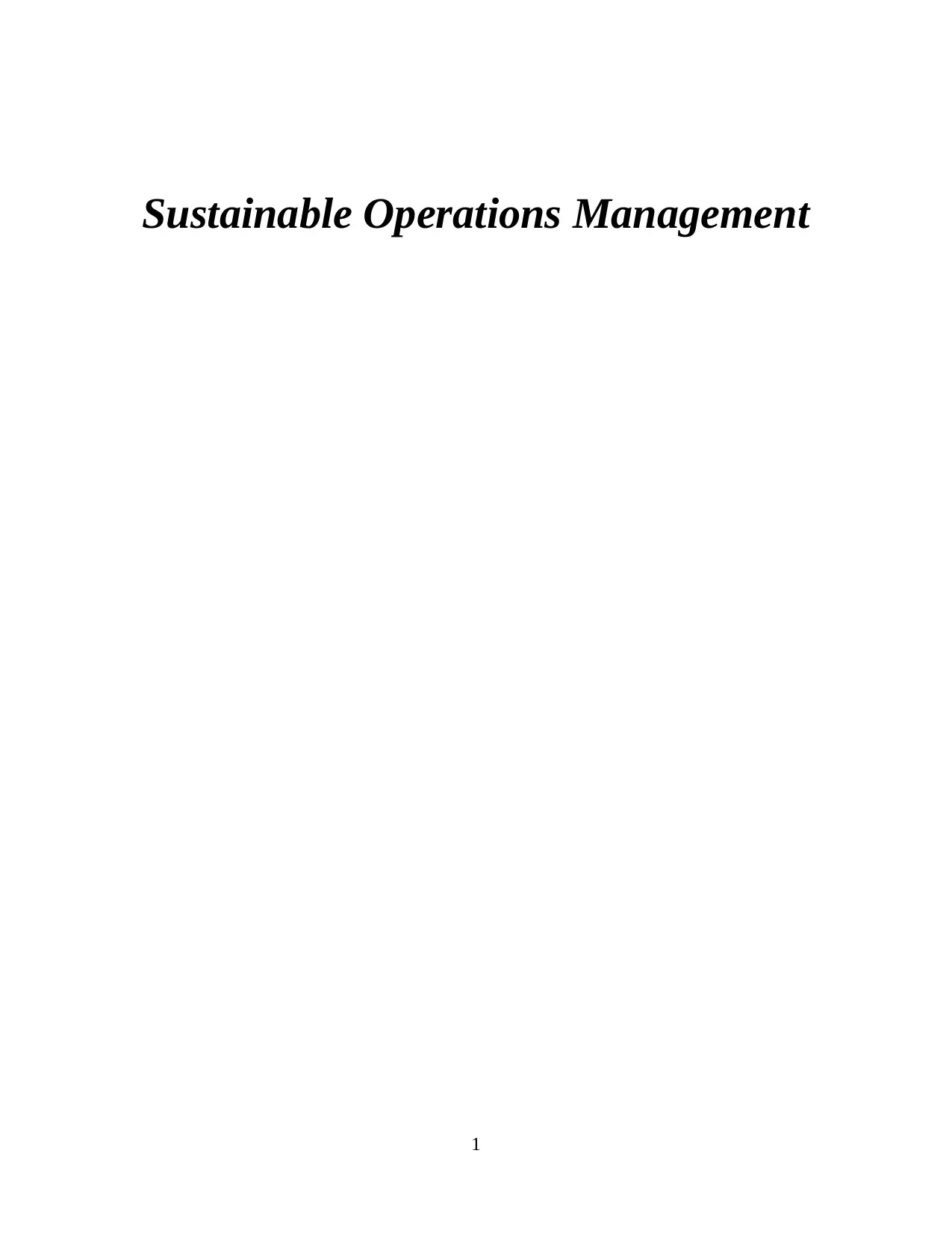
Sustainable Operations Management
1
1
Secure Best Marks with AI Grader
Need help grading? Try our AI Grader for instant feedback on your assignments.
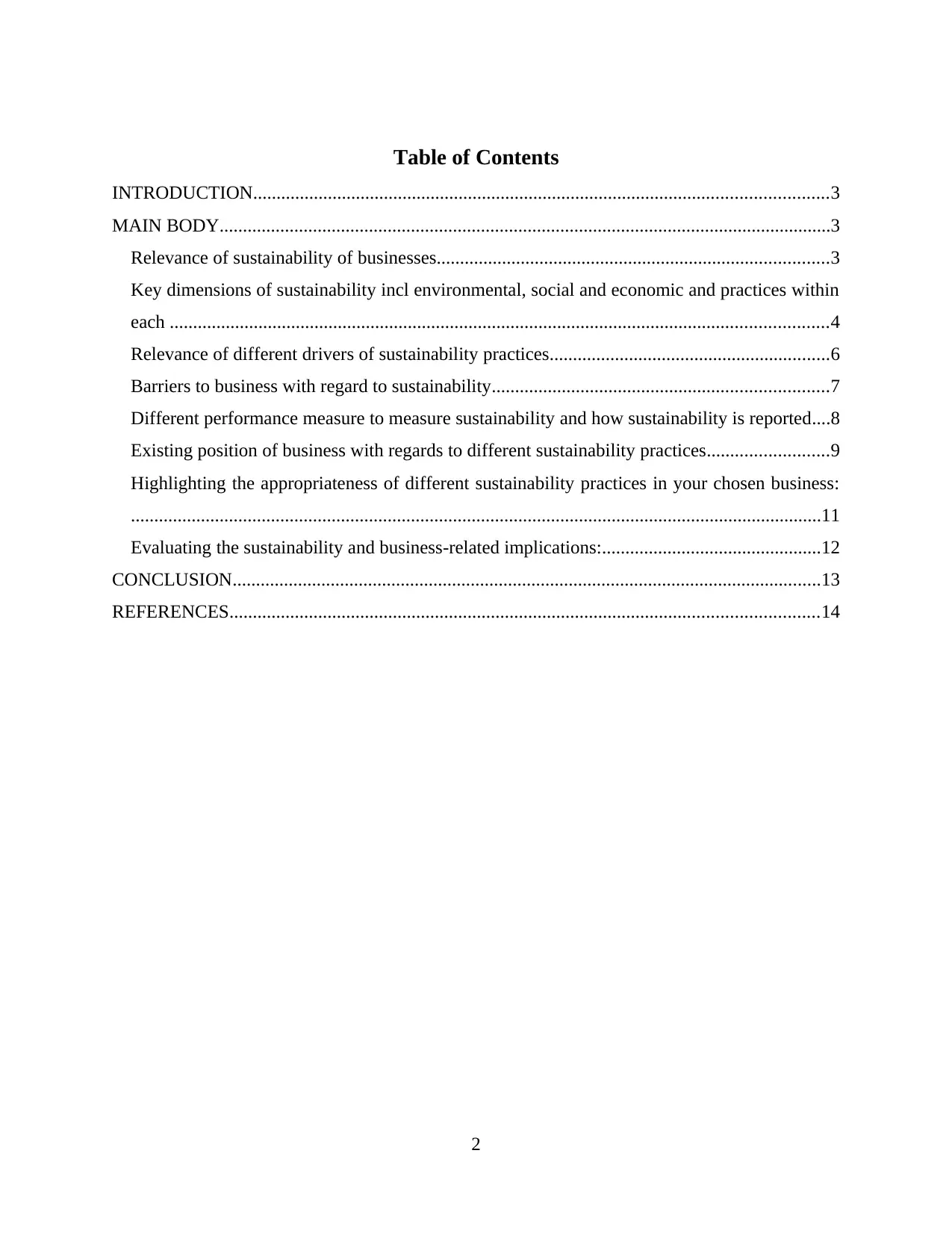
Table of Contents
INTRODUCTION...........................................................................................................................3
MAIN BODY...................................................................................................................................3
Relevance of sustainability of businesses....................................................................................3
Key dimensions of sustainability incl environmental, social and economic and practices within
each .............................................................................................................................................4
Relevance of different drivers of sustainability practices............................................................6
Barriers to business with regard to sustainability........................................................................7
Different performance measure to measure sustainability and how sustainability is reported....8
Existing position of business with regards to different sustainability practices..........................9
Highlighting the appropriateness of different sustainability practices in your chosen business:
....................................................................................................................................................11
Evaluating the sustainability and business-related implications:...............................................12
CONCLUSION..............................................................................................................................13
REFERENCES..............................................................................................................................14
2
INTRODUCTION...........................................................................................................................3
MAIN BODY...................................................................................................................................3
Relevance of sustainability of businesses....................................................................................3
Key dimensions of sustainability incl environmental, social and economic and practices within
each .............................................................................................................................................4
Relevance of different drivers of sustainability practices............................................................6
Barriers to business with regard to sustainability........................................................................7
Different performance measure to measure sustainability and how sustainability is reported....8
Existing position of business with regards to different sustainability practices..........................9
Highlighting the appropriateness of different sustainability practices in your chosen business:
....................................................................................................................................................11
Evaluating the sustainability and business-related implications:...............................................12
CONCLUSION..............................................................................................................................13
REFERENCES..............................................................................................................................14
2
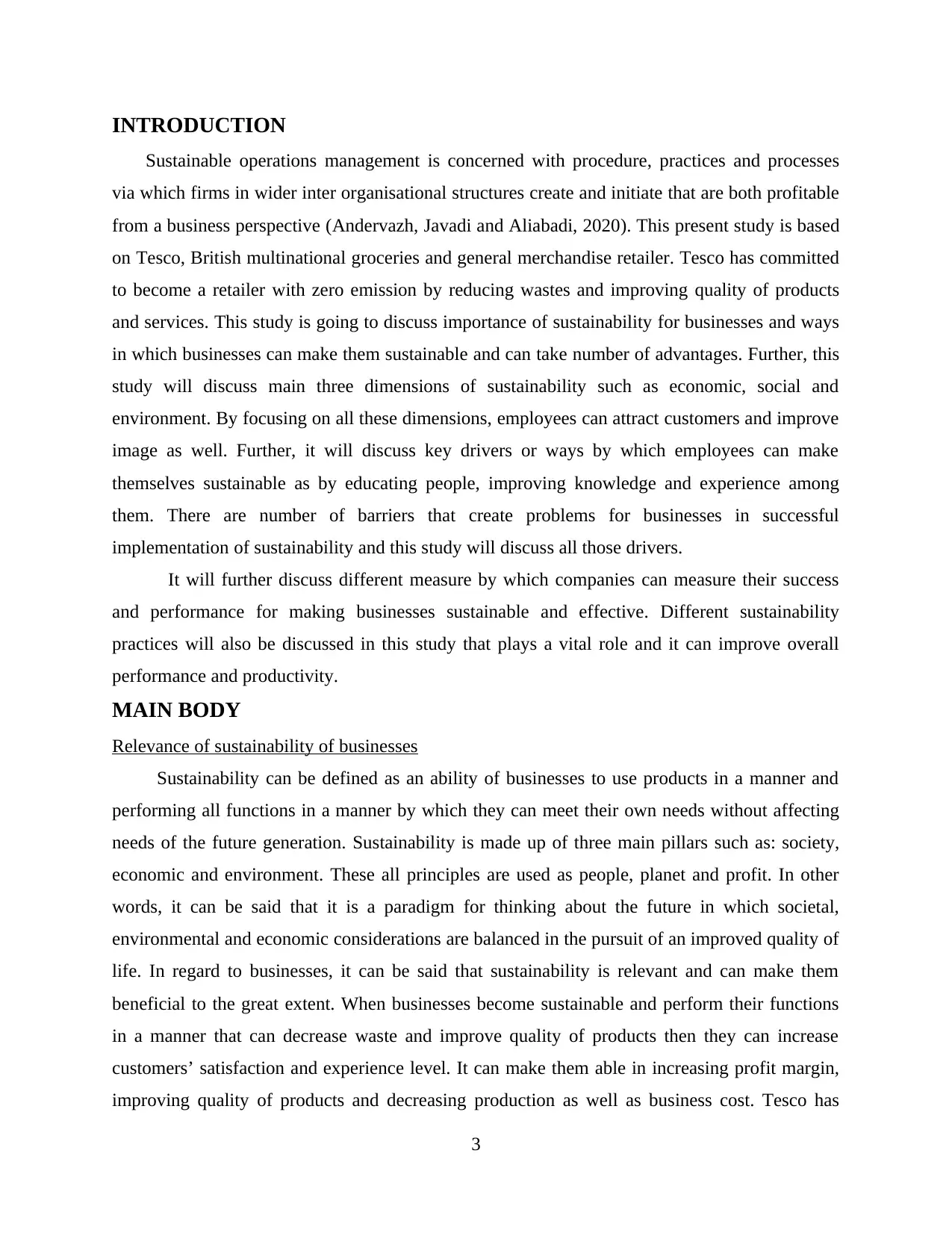
INTRODUCTION
Sustainable operations management is concerned with procedure, practices and processes
via which firms in wider inter organisational structures create and initiate that are both profitable
from a business perspective (Andervazh, Javadi and Aliabadi, 2020). This present study is based
on Tesco, British multinational groceries and general merchandise retailer. Tesco has committed
to become a retailer with zero emission by reducing wastes and improving quality of products
and services. This study is going to discuss importance of sustainability for businesses and ways
in which businesses can make them sustainable and can take number of advantages. Further, this
study will discuss main three dimensions of sustainability such as economic, social and
environment. By focusing on all these dimensions, employees can attract customers and improve
image as well. Further, it will discuss key drivers or ways by which employees can make
themselves sustainable as by educating people, improving knowledge and experience among
them. There are number of barriers that create problems for businesses in successful
implementation of sustainability and this study will discuss all those drivers.
It will further discuss different measure by which companies can measure their success
and performance for making businesses sustainable and effective. Different sustainability
practices will also be discussed in this study that plays a vital role and it can improve overall
performance and productivity.
MAIN BODY
Relevance of sustainability of businesses
Sustainability can be defined as an ability of businesses to use products in a manner and
performing all functions in a manner by which they can meet their own needs without affecting
needs of the future generation. Sustainability is made up of three main pillars such as: society,
economic and environment. These all principles are used as people, planet and profit. In other
words, it can be said that it is a paradigm for thinking about the future in which societal,
environmental and economic considerations are balanced in the pursuit of an improved quality of
life. In regard to businesses, it can be said that sustainability is relevant and can make them
beneficial to the great extent. When businesses become sustainable and perform their functions
in a manner that can decrease waste and improve quality of products then they can increase
customers’ satisfaction and experience level. It can make them able in increasing profit margin,
improving quality of products and decreasing production as well as business cost. Tesco has
3
Sustainable operations management is concerned with procedure, practices and processes
via which firms in wider inter organisational structures create and initiate that are both profitable
from a business perspective (Andervazh, Javadi and Aliabadi, 2020). This present study is based
on Tesco, British multinational groceries and general merchandise retailer. Tesco has committed
to become a retailer with zero emission by reducing wastes and improving quality of products
and services. This study is going to discuss importance of sustainability for businesses and ways
in which businesses can make them sustainable and can take number of advantages. Further, this
study will discuss main three dimensions of sustainability such as economic, social and
environment. By focusing on all these dimensions, employees can attract customers and improve
image as well. Further, it will discuss key drivers or ways by which employees can make
themselves sustainable as by educating people, improving knowledge and experience among
them. There are number of barriers that create problems for businesses in successful
implementation of sustainability and this study will discuss all those drivers.
It will further discuss different measure by which companies can measure their success
and performance for making businesses sustainable and effective. Different sustainability
practices will also be discussed in this study that plays a vital role and it can improve overall
performance and productivity.
MAIN BODY
Relevance of sustainability of businesses
Sustainability can be defined as an ability of businesses to use products in a manner and
performing all functions in a manner by which they can meet their own needs without affecting
needs of the future generation. Sustainability is made up of three main pillars such as: society,
economic and environment. These all principles are used as people, planet and profit. In other
words, it can be said that it is a paradigm for thinking about the future in which societal,
environmental and economic considerations are balanced in the pursuit of an improved quality of
life. In regard to businesses, it can be said that sustainability is relevant and can make them
beneficial to the great extent. When businesses become sustainable and perform their functions
in a manner that can decrease waste and improve quality of products then they can increase
customers’ satisfaction and experience level. It can make them able in increasing profit margin,
improving quality of products and decreasing production as well as business cost. Tesco has
3
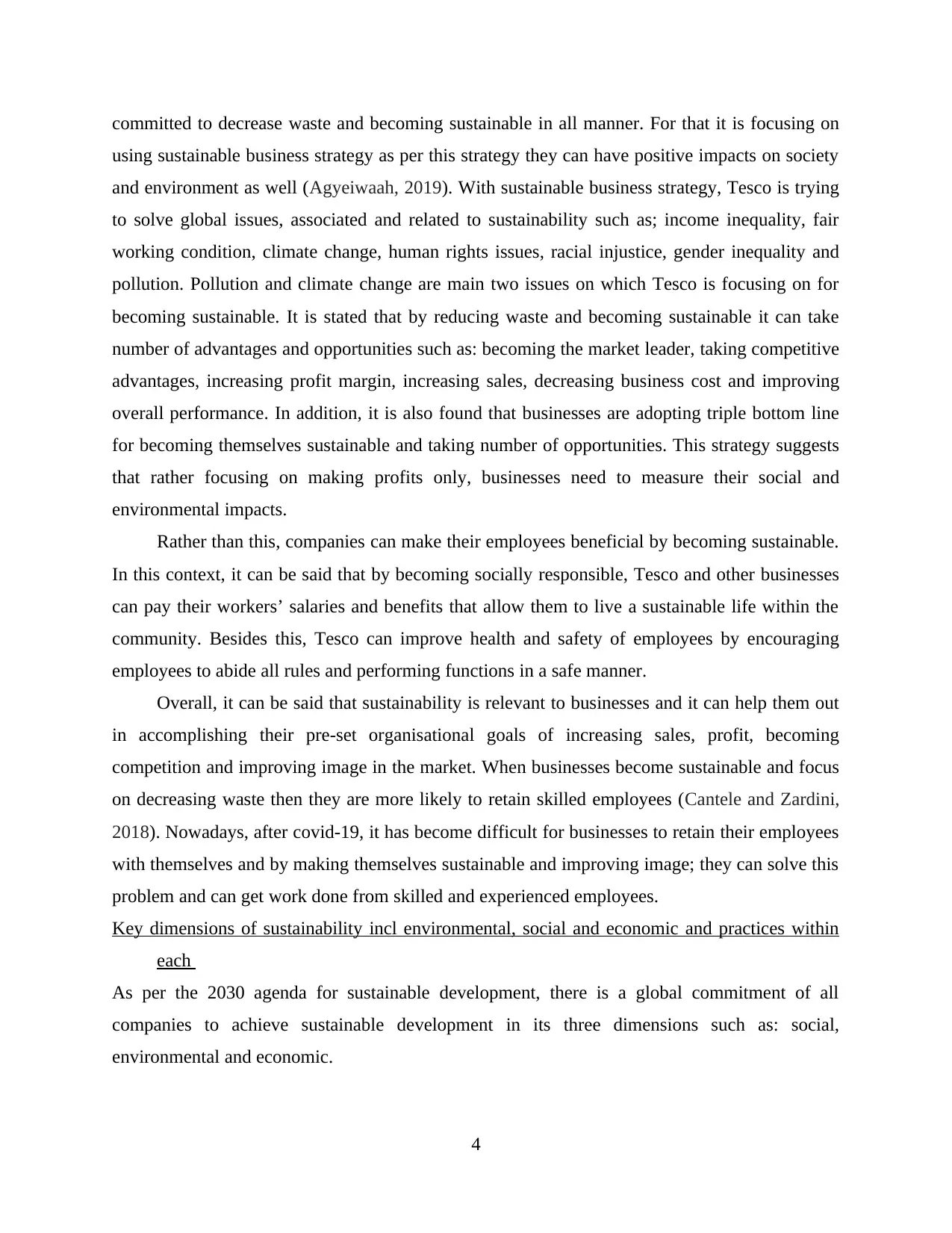
committed to decrease waste and becoming sustainable in all manner. For that it is focusing on
using sustainable business strategy as per this strategy they can have positive impacts on society
and environment as well (Agyeiwaah, 2019). With sustainable business strategy, Tesco is trying
to solve global issues, associated and related to sustainability such as; income inequality, fair
working condition, climate change, human rights issues, racial injustice, gender inequality and
pollution. Pollution and climate change are main two issues on which Tesco is focusing on for
becoming sustainable. It is stated that by reducing waste and becoming sustainable it can take
number of advantages and opportunities such as: becoming the market leader, taking competitive
advantages, increasing profit margin, increasing sales, decreasing business cost and improving
overall performance. In addition, it is also found that businesses are adopting triple bottom line
for becoming themselves sustainable and taking number of opportunities. This strategy suggests
that rather focusing on making profits only, businesses need to measure their social and
environmental impacts.
Rather than this, companies can make their employees beneficial by becoming sustainable.
In this context, it can be said that by becoming socially responsible, Tesco and other businesses
can pay their workers’ salaries and benefits that allow them to live a sustainable life within the
community. Besides this, Tesco can improve health and safety of employees by encouraging
employees to abide all rules and performing functions in a safe manner.
Overall, it can be said that sustainability is relevant to businesses and it can help them out
in accomplishing their pre-set organisational goals of increasing sales, profit, becoming
competition and improving image in the market. When businesses become sustainable and focus
on decreasing waste then they are more likely to retain skilled employees (Cantele and Zardini,
2018). Nowadays, after covid-19, it has become difficult for businesses to retain their employees
with themselves and by making themselves sustainable and improving image; they can solve this
problem and can get work done from skilled and experienced employees.
Key dimensions of sustainability incl environmental, social and economic and practices within
each
As per the 2030 agenda for sustainable development, there is a global commitment of all
companies to achieve sustainable development in its three dimensions such as: social,
environmental and economic.
4
using sustainable business strategy as per this strategy they can have positive impacts on society
and environment as well (Agyeiwaah, 2019). With sustainable business strategy, Tesco is trying
to solve global issues, associated and related to sustainability such as; income inequality, fair
working condition, climate change, human rights issues, racial injustice, gender inequality and
pollution. Pollution and climate change are main two issues on which Tesco is focusing on for
becoming sustainable. It is stated that by reducing waste and becoming sustainable it can take
number of advantages and opportunities such as: becoming the market leader, taking competitive
advantages, increasing profit margin, increasing sales, decreasing business cost and improving
overall performance. In addition, it is also found that businesses are adopting triple bottom line
for becoming themselves sustainable and taking number of opportunities. This strategy suggests
that rather focusing on making profits only, businesses need to measure their social and
environmental impacts.
Rather than this, companies can make their employees beneficial by becoming sustainable.
In this context, it can be said that by becoming socially responsible, Tesco and other businesses
can pay their workers’ salaries and benefits that allow them to live a sustainable life within the
community. Besides this, Tesco can improve health and safety of employees by encouraging
employees to abide all rules and performing functions in a safe manner.
Overall, it can be said that sustainability is relevant to businesses and it can help them out
in accomplishing their pre-set organisational goals of increasing sales, profit, becoming
competition and improving image in the market. When businesses become sustainable and focus
on decreasing waste then they are more likely to retain skilled employees (Cantele and Zardini,
2018). Nowadays, after covid-19, it has become difficult for businesses to retain their employees
with themselves and by making themselves sustainable and improving image; they can solve this
problem and can get work done from skilled and experienced employees.
Key dimensions of sustainability incl environmental, social and economic and practices within
each
As per the 2030 agenda for sustainable development, there is a global commitment of all
companies to achieve sustainable development in its three dimensions such as: social,
environmental and economic.
4
Secure Best Marks with AI Grader
Need help grading? Try our AI Grader for instant feedback on your assignments.
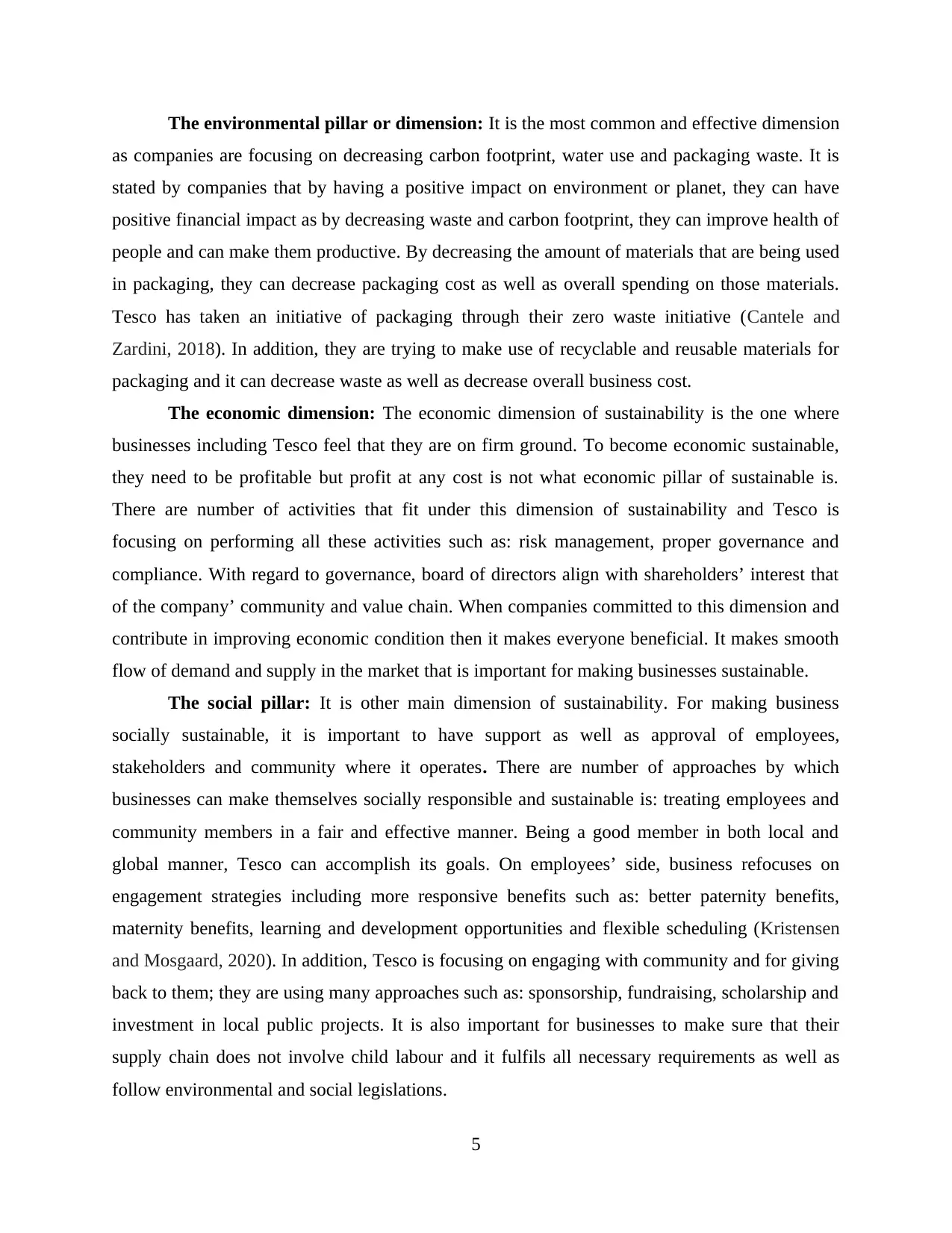
The environmental pillar or dimension: It is the most common and effective dimension
as companies are focusing on decreasing carbon footprint, water use and packaging waste. It is
stated by companies that by having a positive impact on environment or planet, they can have
positive financial impact as by decreasing waste and carbon footprint, they can improve health of
people and can make them productive. By decreasing the amount of materials that are being used
in packaging, they can decrease packaging cost as well as overall spending on those materials.
Tesco has taken an initiative of packaging through their zero waste initiative (Cantele and
Zardini, 2018). In addition, they are trying to make use of recyclable and reusable materials for
packaging and it can decrease waste as well as decrease overall business cost.
The economic dimension: The economic dimension of sustainability is the one where
businesses including Tesco feel that they are on firm ground. To become economic sustainable,
they need to be profitable but profit at any cost is not what economic pillar of sustainable is.
There are number of activities that fit under this dimension of sustainability and Tesco is
focusing on performing all these activities such as: risk management, proper governance and
compliance. With regard to governance, board of directors align with shareholders’ interest that
of the company’ community and value chain. When companies committed to this dimension and
contribute in improving economic condition then it makes everyone beneficial. It makes smooth
flow of demand and supply in the market that is important for making businesses sustainable.
The social pillar: It is other main dimension of sustainability. For making business
socially sustainable, it is important to have support as well as approval of employees,
stakeholders and community where it operates. There are number of approaches by which
businesses can make themselves socially responsible and sustainable is: treating employees and
community members in a fair and effective manner. Being a good member in both local and
global manner, Tesco can accomplish its goals. On employees’ side, business refocuses on
engagement strategies including more responsive benefits such as: better paternity benefits,
maternity benefits, learning and development opportunities and flexible scheduling (Kristensen
and Mosgaard, 2020). In addition, Tesco is focusing on engaging with community and for giving
back to them; they are using many approaches such as: sponsorship, fundraising, scholarship and
investment in local public projects. It is also important for businesses to make sure that their
supply chain does not involve child labour and it fulfils all necessary requirements as well as
follow environmental and social legislations.
5
as companies are focusing on decreasing carbon footprint, water use and packaging waste. It is
stated by companies that by having a positive impact on environment or planet, they can have
positive financial impact as by decreasing waste and carbon footprint, they can improve health of
people and can make them productive. By decreasing the amount of materials that are being used
in packaging, they can decrease packaging cost as well as overall spending on those materials.
Tesco has taken an initiative of packaging through their zero waste initiative (Cantele and
Zardini, 2018). In addition, they are trying to make use of recyclable and reusable materials for
packaging and it can decrease waste as well as decrease overall business cost.
The economic dimension: The economic dimension of sustainability is the one where
businesses including Tesco feel that they are on firm ground. To become economic sustainable,
they need to be profitable but profit at any cost is not what economic pillar of sustainable is.
There are number of activities that fit under this dimension of sustainability and Tesco is
focusing on performing all these activities such as: risk management, proper governance and
compliance. With regard to governance, board of directors align with shareholders’ interest that
of the company’ community and value chain. When companies committed to this dimension and
contribute in improving economic condition then it makes everyone beneficial. It makes smooth
flow of demand and supply in the market that is important for making businesses sustainable.
The social pillar: It is other main dimension of sustainability. For making business
socially sustainable, it is important to have support as well as approval of employees,
stakeholders and community where it operates. There are number of approaches by which
businesses can make themselves socially responsible and sustainable is: treating employees and
community members in a fair and effective manner. Being a good member in both local and
global manner, Tesco can accomplish its goals. On employees’ side, business refocuses on
engagement strategies including more responsive benefits such as: better paternity benefits,
maternity benefits, learning and development opportunities and flexible scheduling (Kristensen
and Mosgaard, 2020). In addition, Tesco is focusing on engaging with community and for giving
back to them; they are using many approaches such as: sponsorship, fundraising, scholarship and
investment in local public projects. It is also important for businesses to make sure that their
supply chain does not involve child labour and it fulfils all necessary requirements as well as
follow environmental and social legislations.
5
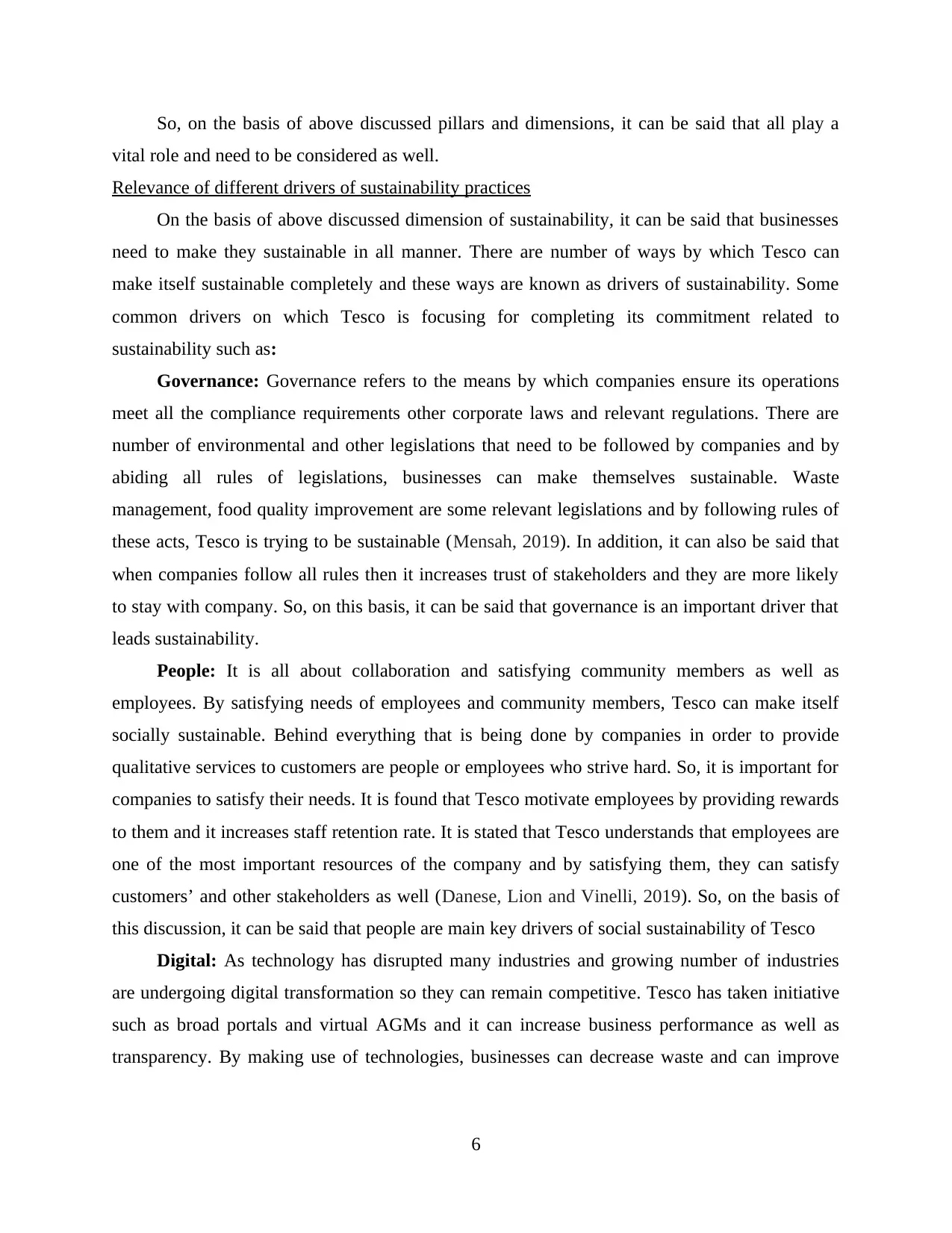
So, on the basis of above discussed pillars and dimensions, it can be said that all play a
vital role and need to be considered as well.
Relevance of different drivers of sustainability practices
On the basis of above discussed dimension of sustainability, it can be said that businesses
need to make they sustainable in all manner. There are number of ways by which Tesco can
make itself sustainable completely and these ways are known as drivers of sustainability. Some
common drivers on which Tesco is focusing for completing its commitment related to
sustainability such as:
Governance: Governance refers to the means by which companies ensure its operations
meet all the compliance requirements other corporate laws and relevant regulations. There are
number of environmental and other legislations that need to be followed by companies and by
abiding all rules of legislations, businesses can make themselves sustainable. Waste
management, food quality improvement are some relevant legislations and by following rules of
these acts, Tesco is trying to be sustainable (Mensah, 2019). In addition, it can also be said that
when companies follow all rules then it increases trust of stakeholders and they are more likely
to stay with company. So, on this basis, it can be said that governance is an important driver that
leads sustainability.
People: It is all about collaboration and satisfying community members as well as
employees. By satisfying needs of employees and community members, Tesco can make itself
socially sustainable. Behind everything that is being done by companies in order to provide
qualitative services to customers are people or employees who strive hard. So, it is important for
companies to satisfy their needs. It is found that Tesco motivate employees by providing rewards
to them and it increases staff retention rate. It is stated that Tesco understands that employees are
one of the most important resources of the company and by satisfying them, they can satisfy
customers’ and other stakeholders as well (Danese, Lion and Vinelli, 2019). So, on the basis of
this discussion, it can be said that people are main key drivers of social sustainability of Tesco
Digital: As technology has disrupted many industries and growing number of industries
are undergoing digital transformation so they can remain competitive. Tesco has taken initiative
such as broad portals and virtual AGMs and it can increase business performance as well as
transparency. By making use of technologies, businesses can decrease waste and can improve
6
vital role and need to be considered as well.
Relevance of different drivers of sustainability practices
On the basis of above discussed dimension of sustainability, it can be said that businesses
need to make they sustainable in all manner. There are number of ways by which Tesco can
make itself sustainable completely and these ways are known as drivers of sustainability. Some
common drivers on which Tesco is focusing for completing its commitment related to
sustainability such as:
Governance: Governance refers to the means by which companies ensure its operations
meet all the compliance requirements other corporate laws and relevant regulations. There are
number of environmental and other legislations that need to be followed by companies and by
abiding all rules of legislations, businesses can make themselves sustainable. Waste
management, food quality improvement are some relevant legislations and by following rules of
these acts, Tesco is trying to be sustainable (Mensah, 2019). In addition, it can also be said that
when companies follow all rules then it increases trust of stakeholders and they are more likely
to stay with company. So, on this basis, it can be said that governance is an important driver that
leads sustainability.
People: It is all about collaboration and satisfying community members as well as
employees. By satisfying needs of employees and community members, Tesco can make itself
socially sustainable. Behind everything that is being done by companies in order to provide
qualitative services to customers are people or employees who strive hard. So, it is important for
companies to satisfy their needs. It is found that Tesco motivate employees by providing rewards
to them and it increases staff retention rate. It is stated that Tesco understands that employees are
one of the most important resources of the company and by satisfying them, they can satisfy
customers’ and other stakeholders as well (Danese, Lion and Vinelli, 2019). So, on the basis of
this discussion, it can be said that people are main key drivers of social sustainability of Tesco
Digital: As technology has disrupted many industries and growing number of industries
are undergoing digital transformation so they can remain competitive. Tesco has taken initiative
such as broad portals and virtual AGMs and it can increase business performance as well as
transparency. By making use of technologies, businesses can decrease waste and can improve
6
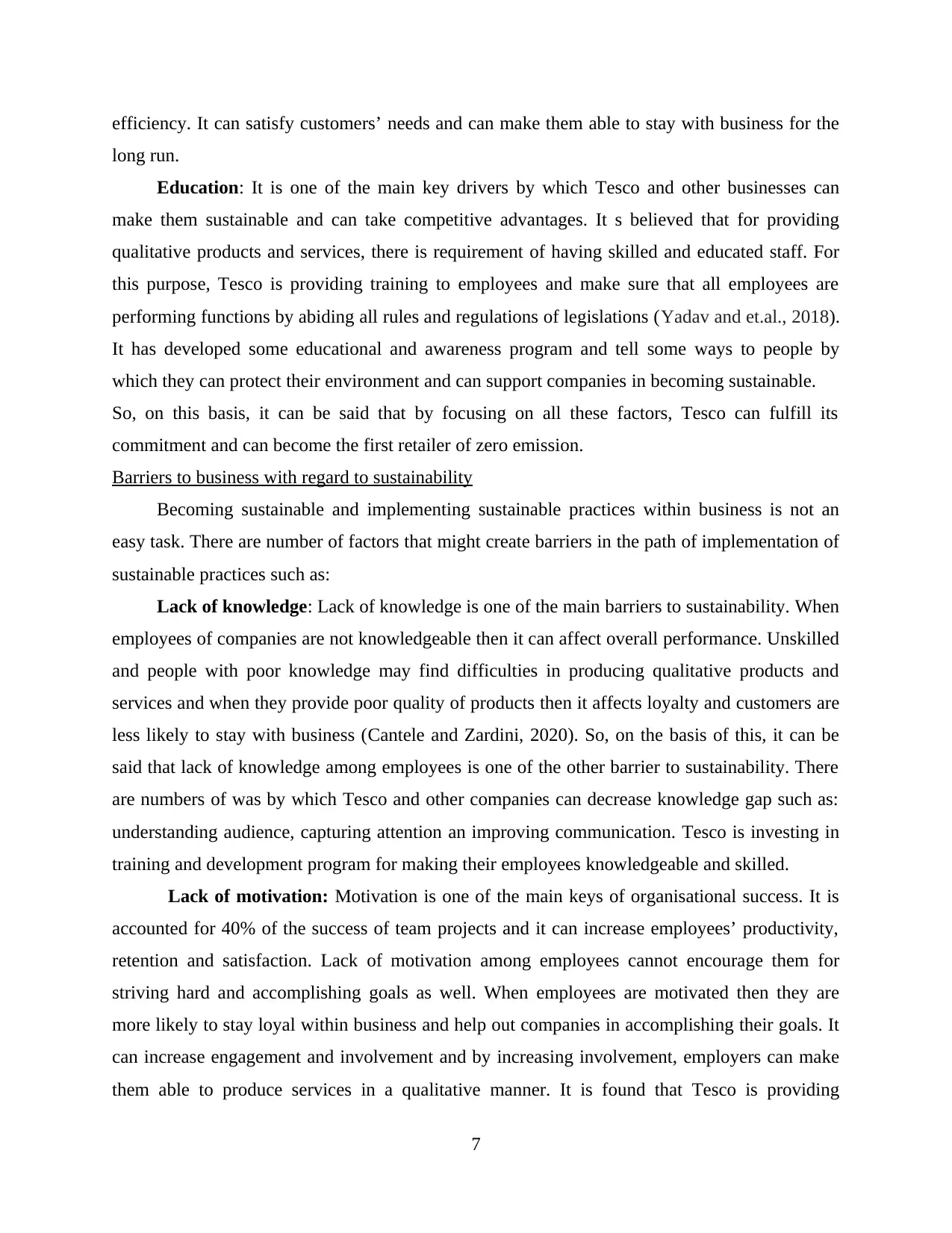
efficiency. It can satisfy customers’ needs and can make them able to stay with business for the
long run.
Education: It is one of the main key drivers by which Tesco and other businesses can
make them sustainable and can take competitive advantages. It s believed that for providing
qualitative products and services, there is requirement of having skilled and educated staff. For
this purpose, Tesco is providing training to employees and make sure that all employees are
performing functions by abiding all rules and regulations of legislations (Yadav and et.al., 2018).
It has developed some educational and awareness program and tell some ways to people by
which they can protect their environment and can support companies in becoming sustainable.
So, on this basis, it can be said that by focusing on all these factors, Tesco can fulfill its
commitment and can become the first retailer of zero emission.
Barriers to business with regard to sustainability
Becoming sustainable and implementing sustainable practices within business is not an
easy task. There are number of factors that might create barriers in the path of implementation of
sustainable practices such as:
Lack of knowledge: Lack of knowledge is one of the main barriers to sustainability. When
employees of companies are not knowledgeable then it can affect overall performance. Unskilled
and people with poor knowledge may find difficulties in producing qualitative products and
services and when they provide poor quality of products then it affects loyalty and customers are
less likely to stay with business (Cantele and Zardini, 2020). So, on the basis of this, it can be
said that lack of knowledge among employees is one of the other barrier to sustainability. There
are numbers of was by which Tesco and other companies can decrease knowledge gap such as:
understanding audience, capturing attention an improving communication. Tesco is investing in
training and development program for making their employees knowledgeable and skilled.
Lack of motivation: Motivation is one of the main keys of organisational success. It is
accounted for 40% of the success of team projects and it can increase employees’ productivity,
retention and satisfaction. Lack of motivation among employees cannot encourage them for
striving hard and accomplishing goals as well. When employees are motivated then they are
more likely to stay loyal within business and help out companies in accomplishing their goals. It
can increase engagement and involvement and by increasing involvement, employers can make
them able to produce services in a qualitative manner. It is found that Tesco is providing
7
long run.
Education: It is one of the main key drivers by which Tesco and other businesses can
make them sustainable and can take competitive advantages. It s believed that for providing
qualitative products and services, there is requirement of having skilled and educated staff. For
this purpose, Tesco is providing training to employees and make sure that all employees are
performing functions by abiding all rules and regulations of legislations (Yadav and et.al., 2018).
It has developed some educational and awareness program and tell some ways to people by
which they can protect their environment and can support companies in becoming sustainable.
So, on this basis, it can be said that by focusing on all these factors, Tesco can fulfill its
commitment and can become the first retailer of zero emission.
Barriers to business with regard to sustainability
Becoming sustainable and implementing sustainable practices within business is not an
easy task. There are number of factors that might create barriers in the path of implementation of
sustainable practices such as:
Lack of knowledge: Lack of knowledge is one of the main barriers to sustainability. When
employees of companies are not knowledgeable then it can affect overall performance. Unskilled
and people with poor knowledge may find difficulties in producing qualitative products and
services and when they provide poor quality of products then it affects loyalty and customers are
less likely to stay with business (Cantele and Zardini, 2020). So, on the basis of this, it can be
said that lack of knowledge among employees is one of the other barrier to sustainability. There
are numbers of was by which Tesco and other companies can decrease knowledge gap such as:
understanding audience, capturing attention an improving communication. Tesco is investing in
training and development program for making their employees knowledgeable and skilled.
Lack of motivation: Motivation is one of the main keys of organisational success. It is
accounted for 40% of the success of team projects and it can increase employees’ productivity,
retention and satisfaction. Lack of motivation among employees cannot encourage them for
striving hard and accomplishing goals as well. When employees are motivated then they are
more likely to stay loyal within business and help out companies in accomplishing their goals. It
can increase engagement and involvement and by increasing involvement, employers can make
them able to produce services in a qualitative manner. It is found that Tesco is providing
7
Paraphrase This Document
Need a fresh take? Get an instant paraphrase of this document with our AI Paraphraser
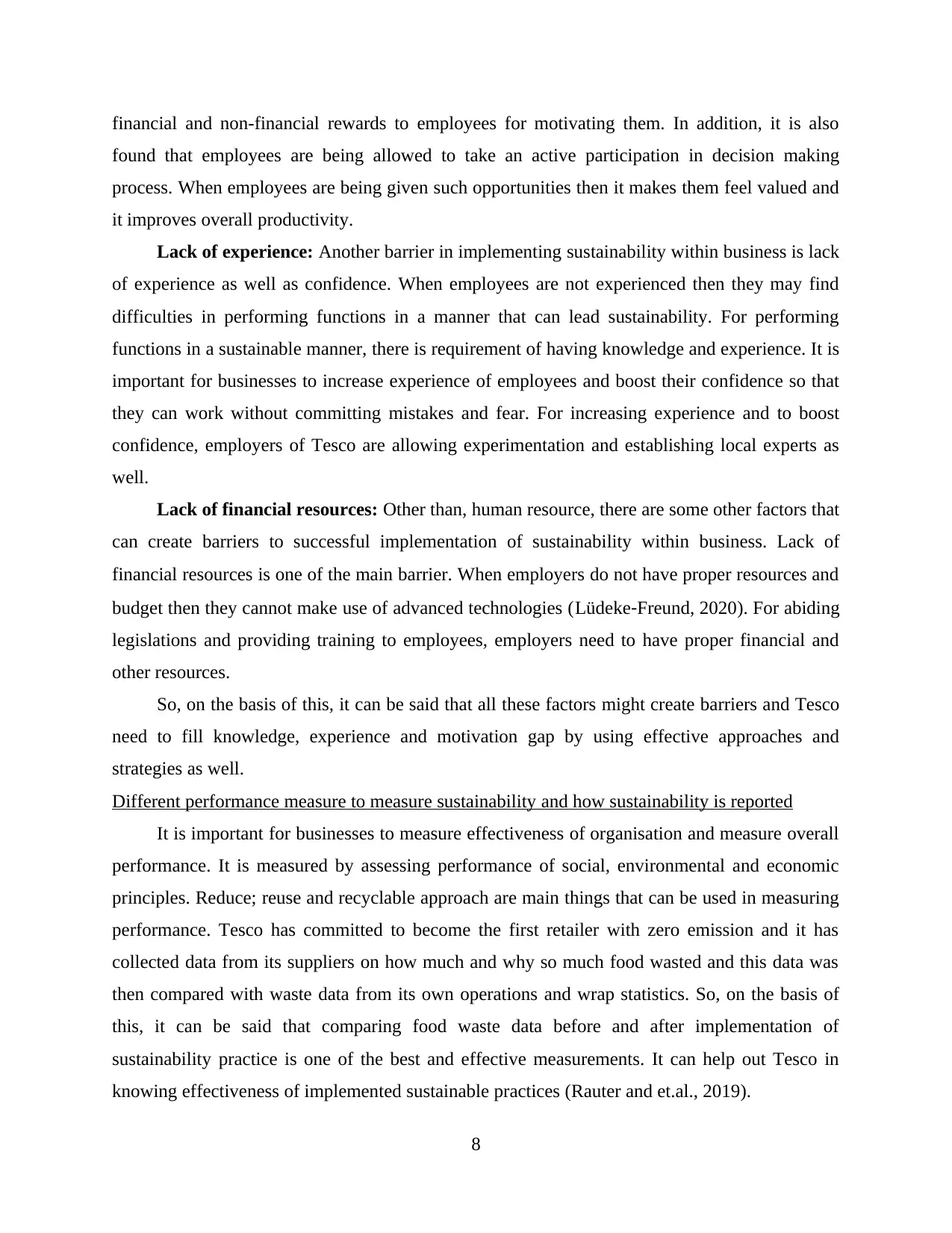
financial and non-financial rewards to employees for motivating them. In addition, it is also
found that employees are being allowed to take an active participation in decision making
process. When employees are being given such opportunities then it makes them feel valued and
it improves overall productivity.
Lack of experience: Another barrier in implementing sustainability within business is lack
of experience as well as confidence. When employees are not experienced then they may find
difficulties in performing functions in a manner that can lead sustainability. For performing
functions in a sustainable manner, there is requirement of having knowledge and experience. It is
important for businesses to increase experience of employees and boost their confidence so that
they can work without committing mistakes and fear. For increasing experience and to boost
confidence, employers of Tesco are allowing experimentation and establishing local experts as
well.
Lack of financial resources: Other than, human resource, there are some other factors that
can create barriers to successful implementation of sustainability within business. Lack of
financial resources is one of the main barrier. When employers do not have proper resources and
budget then they cannot make use of advanced technologies (Lüdeke‐Freund, 2020). For abiding
legislations and providing training to employees, employers need to have proper financial and
other resources.
So, on the basis of this, it can be said that all these factors might create barriers and Tesco
need to fill knowledge, experience and motivation gap by using effective approaches and
strategies as well.
Different performance measure to measure sustainability and how sustainability is reported
It is important for businesses to measure effectiveness of organisation and measure overall
performance. It is measured by assessing performance of social, environmental and economic
principles. Reduce; reuse and recyclable approach are main things that can be used in measuring
performance. Tesco has committed to become the first retailer with zero emission and it has
collected data from its suppliers on how much and why so much food wasted and this data was
then compared with waste data from its own operations and wrap statistics. So, on the basis of
this, it can be said that comparing food waste data before and after implementation of
sustainability practice is one of the best and effective measurements. It can help out Tesco in
knowing effectiveness of implemented sustainable practices (Rauter and et.al., 2019).
8
found that employees are being allowed to take an active participation in decision making
process. When employees are being given such opportunities then it makes them feel valued and
it improves overall productivity.
Lack of experience: Another barrier in implementing sustainability within business is lack
of experience as well as confidence. When employees are not experienced then they may find
difficulties in performing functions in a manner that can lead sustainability. For performing
functions in a sustainable manner, there is requirement of having knowledge and experience. It is
important for businesses to increase experience of employees and boost their confidence so that
they can work without committing mistakes and fear. For increasing experience and to boost
confidence, employers of Tesco are allowing experimentation and establishing local experts as
well.
Lack of financial resources: Other than, human resource, there are some other factors that
can create barriers to successful implementation of sustainability within business. Lack of
financial resources is one of the main barrier. When employers do not have proper resources and
budget then they cannot make use of advanced technologies (Lüdeke‐Freund, 2020). For abiding
legislations and providing training to employees, employers need to have proper financial and
other resources.
So, on the basis of this, it can be said that all these factors might create barriers and Tesco
need to fill knowledge, experience and motivation gap by using effective approaches and
strategies as well.
Different performance measure to measure sustainability and how sustainability is reported
It is important for businesses to measure effectiveness of organisation and measure overall
performance. It is measured by assessing performance of social, environmental and economic
principles. Reduce; reuse and recyclable approach are main things that can be used in measuring
performance. Tesco has committed to become the first retailer with zero emission and it has
collected data from its suppliers on how much and why so much food wasted and this data was
then compared with waste data from its own operations and wrap statistics. So, on the basis of
this, it can be said that comparing food waste data before and after implementation of
sustainability practice is one of the best and effective measurements. It can help out Tesco in
knowing effectiveness of implemented sustainable practices (Rauter and et.al., 2019).
8
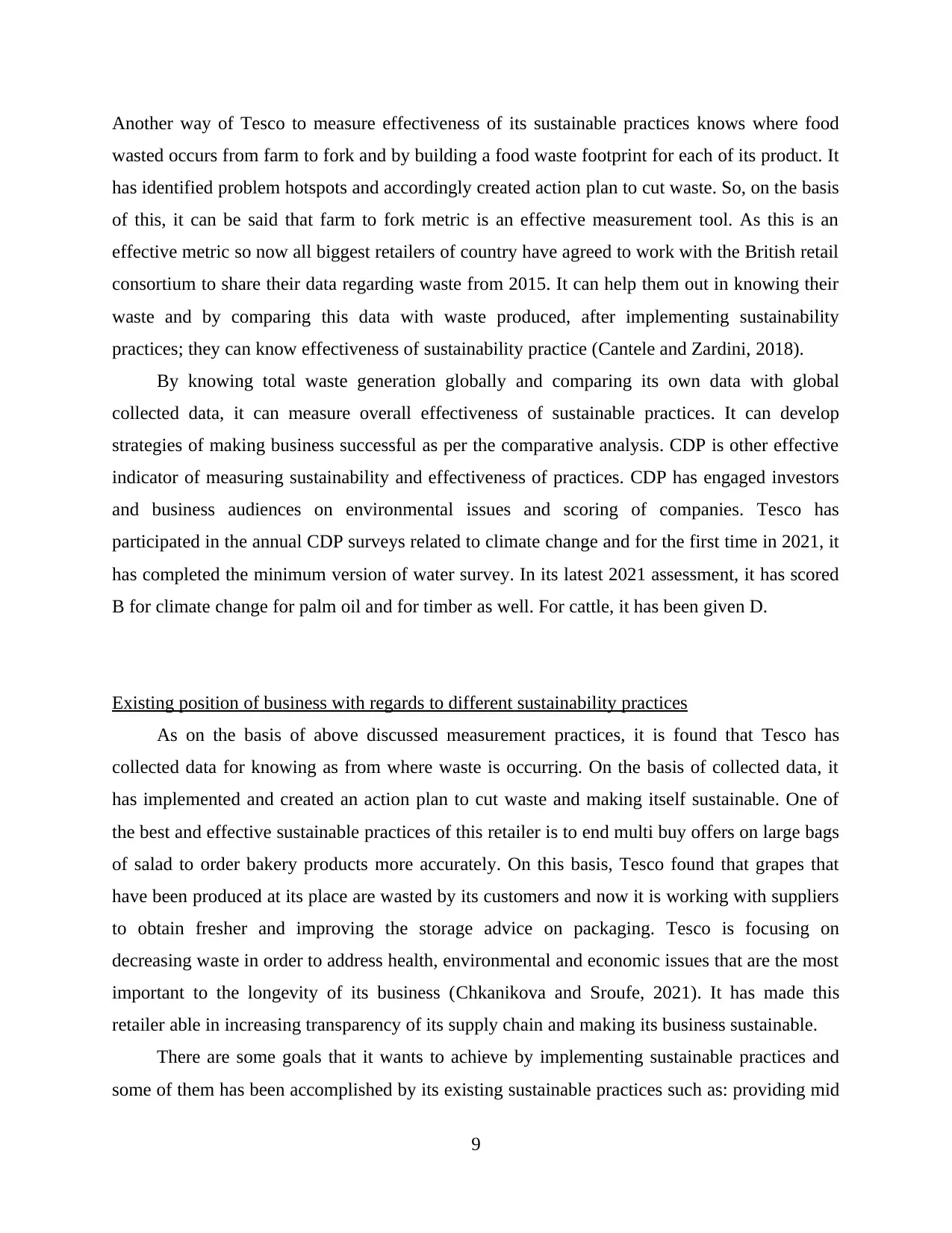
Another way of Tesco to measure effectiveness of its sustainable practices knows where food
wasted occurs from farm to fork and by building a food waste footprint for each of its product. It
has identified problem hotspots and accordingly created action plan to cut waste. So, on the basis
of this, it can be said that farm to fork metric is an effective measurement tool. As this is an
effective metric so now all biggest retailers of country have agreed to work with the British retail
consortium to share their data regarding waste from 2015. It can help them out in knowing their
waste and by comparing this data with waste produced, after implementing sustainability
practices; they can know effectiveness of sustainability practice (Cantele and Zardini, 2018).
By knowing total waste generation globally and comparing its own data with global
collected data, it can measure overall effectiveness of sustainable practices. It can develop
strategies of making business successful as per the comparative analysis. CDP is other effective
indicator of measuring sustainability and effectiveness of practices. CDP has engaged investors
and business audiences on environmental issues and scoring of companies. Tesco has
participated in the annual CDP surveys related to climate change and for the first time in 2021, it
has completed the minimum version of water survey. In its latest 2021 assessment, it has scored
B for climate change for palm oil and for timber as well. For cattle, it has been given D.
Existing position of business with regards to different sustainability practices
As on the basis of above discussed measurement practices, it is found that Tesco has
collected data for knowing as from where waste is occurring. On the basis of collected data, it
has implemented and created an action plan to cut waste and making itself sustainable. One of
the best and effective sustainable practices of this retailer is to end multi buy offers on large bags
of salad to order bakery products more accurately. On this basis, Tesco found that grapes that
have been produced at its place are wasted by its customers and now it is working with suppliers
to obtain fresher and improving the storage advice on packaging. Tesco is focusing on
decreasing waste in order to address health, environmental and economic issues that are the most
important to the longevity of its business (Chkanikova and Sroufe, 2021). It has made this
retailer able in increasing transparency of its supply chain and making its business sustainable.
There are some goals that it wants to achieve by implementing sustainable practices and
some of them has been accomplished by its existing sustainable practices such as: providing mid
9
wasted occurs from farm to fork and by building a food waste footprint for each of its product. It
has identified problem hotspots and accordingly created action plan to cut waste. So, on the basis
of this, it can be said that farm to fork metric is an effective measurement tool. As this is an
effective metric so now all biggest retailers of country have agreed to work with the British retail
consortium to share their data regarding waste from 2015. It can help them out in knowing their
waste and by comparing this data with waste produced, after implementing sustainability
practices; they can know effectiveness of sustainability practice (Cantele and Zardini, 2018).
By knowing total waste generation globally and comparing its own data with global
collected data, it can measure overall effectiveness of sustainable practices. It can develop
strategies of making business successful as per the comparative analysis. CDP is other effective
indicator of measuring sustainability and effectiveness of practices. CDP has engaged investors
and business audiences on environmental issues and scoring of companies. Tesco has
participated in the annual CDP surveys related to climate change and for the first time in 2021, it
has completed the minimum version of water survey. In its latest 2021 assessment, it has scored
B for climate change for palm oil and for timber as well. For cattle, it has been given D.
Existing position of business with regards to different sustainability practices
As on the basis of above discussed measurement practices, it is found that Tesco has
collected data for knowing as from where waste is occurring. On the basis of collected data, it
has implemented and created an action plan to cut waste and making itself sustainable. One of
the best and effective sustainable practices of this retailer is to end multi buy offers on large bags
of salad to order bakery products more accurately. On this basis, Tesco found that grapes that
have been produced at its place are wasted by its customers and now it is working with suppliers
to obtain fresher and improving the storage advice on packaging. Tesco is focusing on
decreasing waste in order to address health, environmental and economic issues that are the most
important to the longevity of its business (Chkanikova and Sroufe, 2021). It has made this
retailer able in increasing transparency of its supply chain and making its business sustainable.
There are some goals that it wants to achieve by implementing sustainable practices and
some of them has been accomplished by its existing sustainable practices such as: providing mid
9
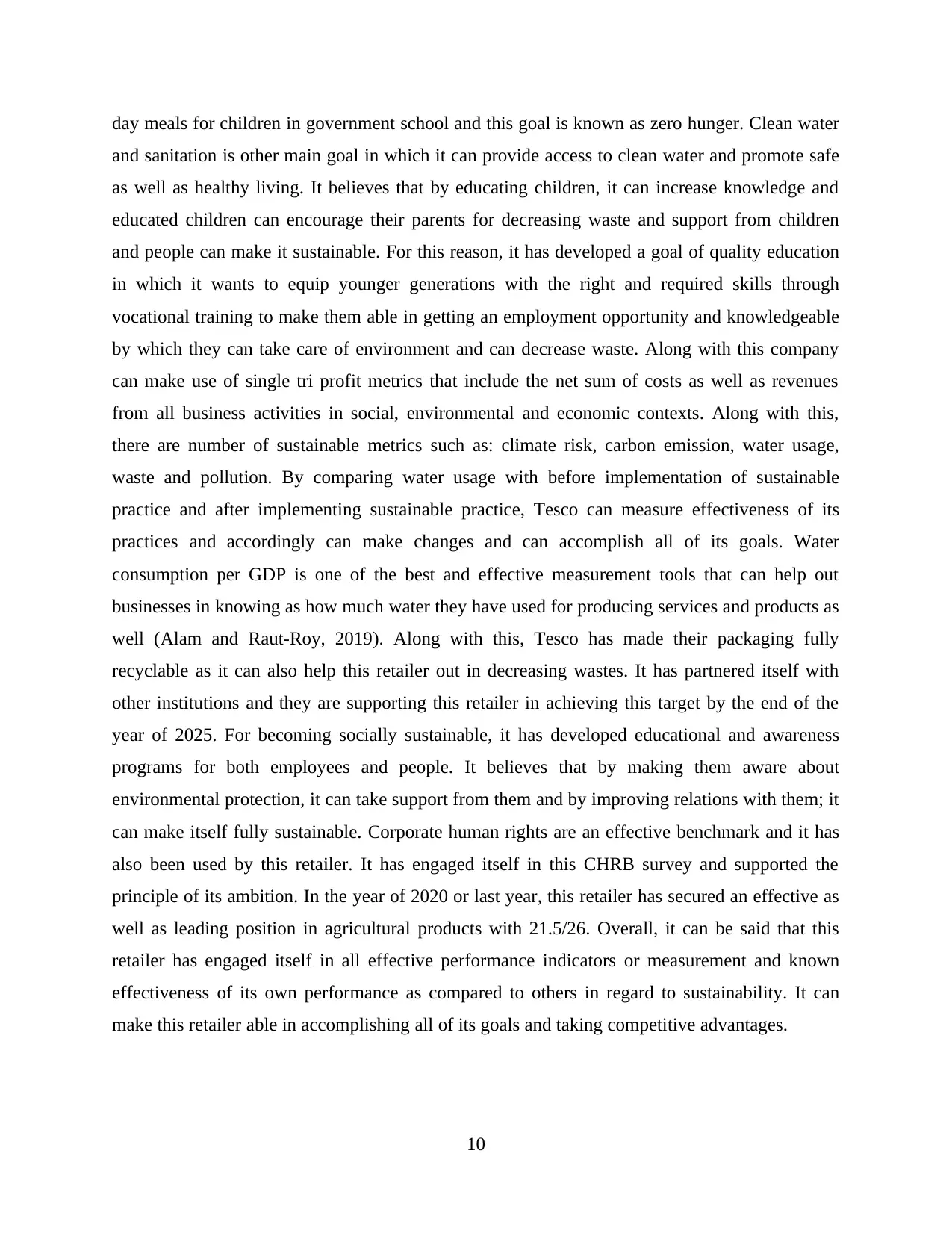
day meals for children in government school and this goal is known as zero hunger. Clean water
and sanitation is other main goal in which it can provide access to clean water and promote safe
as well as healthy living. It believes that by educating children, it can increase knowledge and
educated children can encourage their parents for decreasing waste and support from children
and people can make it sustainable. For this reason, it has developed a goal of quality education
in which it wants to equip younger generations with the right and required skills through
vocational training to make them able in getting an employment opportunity and knowledgeable
by which they can take care of environment and can decrease waste. Along with this company
can make use of single tri profit metrics that include the net sum of costs as well as revenues
from all business activities in social, environmental and economic contexts. Along with this,
there are number of sustainable metrics such as: climate risk, carbon emission, water usage,
waste and pollution. By comparing water usage with before implementation of sustainable
practice and after implementing sustainable practice, Tesco can measure effectiveness of its
practices and accordingly can make changes and can accomplish all of its goals. Water
consumption per GDP is one of the best and effective measurement tools that can help out
businesses in knowing as how much water they have used for producing services and products as
well (Alam and Raut-Roy, 2019). Along with this, Tesco has made their packaging fully
recyclable as it can also help this retailer out in decreasing wastes. It has partnered itself with
other institutions and they are supporting this retailer in achieving this target by the end of the
year of 2025. For becoming socially sustainable, it has developed educational and awareness
programs for both employees and people. It believes that by making them aware about
environmental protection, it can take support from them and by improving relations with them; it
can make itself fully sustainable. Corporate human rights are an effective benchmark and it has
also been used by this retailer. It has engaged itself in this CHRB survey and supported the
principle of its ambition. In the year of 2020 or last year, this retailer has secured an effective as
well as leading position in agricultural products with 21.5/26. Overall, it can be said that this
retailer has engaged itself in all effective performance indicators or measurement and known
effectiveness of its own performance as compared to others in regard to sustainability. It can
make this retailer able in accomplishing all of its goals and taking competitive advantages.
10
and sanitation is other main goal in which it can provide access to clean water and promote safe
as well as healthy living. It believes that by educating children, it can increase knowledge and
educated children can encourage their parents for decreasing waste and support from children
and people can make it sustainable. For this reason, it has developed a goal of quality education
in which it wants to equip younger generations with the right and required skills through
vocational training to make them able in getting an employment opportunity and knowledgeable
by which they can take care of environment and can decrease waste. Along with this company
can make use of single tri profit metrics that include the net sum of costs as well as revenues
from all business activities in social, environmental and economic contexts. Along with this,
there are number of sustainable metrics such as: climate risk, carbon emission, water usage,
waste and pollution. By comparing water usage with before implementation of sustainable
practice and after implementing sustainable practice, Tesco can measure effectiveness of its
practices and accordingly can make changes and can accomplish all of its goals. Water
consumption per GDP is one of the best and effective measurement tools that can help out
businesses in knowing as how much water they have used for producing services and products as
well (Alam and Raut-Roy, 2019). Along with this, Tesco has made their packaging fully
recyclable as it can also help this retailer out in decreasing wastes. It has partnered itself with
other institutions and they are supporting this retailer in achieving this target by the end of the
year of 2025. For becoming socially sustainable, it has developed educational and awareness
programs for both employees and people. It believes that by making them aware about
environmental protection, it can take support from them and by improving relations with them; it
can make itself fully sustainable. Corporate human rights are an effective benchmark and it has
also been used by this retailer. It has engaged itself in this CHRB survey and supported the
principle of its ambition. In the year of 2020 or last year, this retailer has secured an effective as
well as leading position in agricultural products with 21.5/26. Overall, it can be said that this
retailer has engaged itself in all effective performance indicators or measurement and known
effectiveness of its own performance as compared to others in regard to sustainability. It can
make this retailer able in accomplishing all of its goals and taking competitive advantages.
10
Secure Best Marks with AI Grader
Need help grading? Try our AI Grader for instant feedback on your assignments.
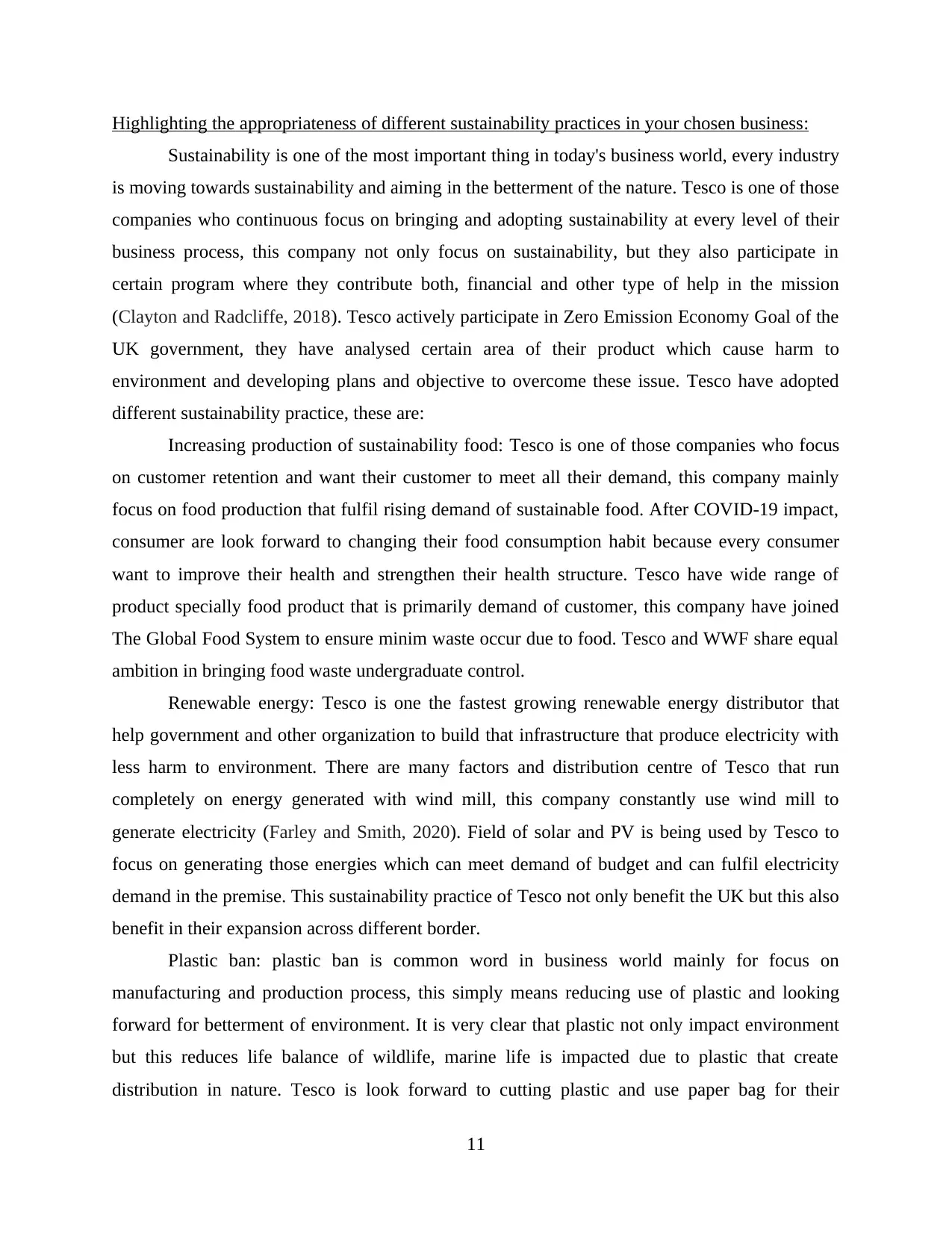
Highlighting the appropriateness of different sustainability practices in your chosen business:
Sustainability is one of the most important thing in today's business world, every industry
is moving towards sustainability and aiming in the betterment of the nature. Tesco is one of those
companies who continuous focus on bringing and adopting sustainability at every level of their
business process, this company not only focus on sustainability, but they also participate in
certain program where they contribute both, financial and other type of help in the mission
(Clayton and Radcliffe, 2018). Tesco actively participate in Zero Emission Economy Goal of the
UK government, they have analysed certain area of their product which cause harm to
environment and developing plans and objective to overcome these issue. Tesco have adopted
different sustainability practice, these are:
Increasing production of sustainability food: Tesco is one of those companies who focus
on customer retention and want their customer to meet all their demand, this company mainly
focus on food production that fulfil rising demand of sustainable food. After COVID-19 impact,
consumer are look forward to changing their food consumption habit because every consumer
want to improve their health and strengthen their health structure. Tesco have wide range of
product specially food product that is primarily demand of customer, this company have joined
The Global Food System to ensure minim waste occur due to food. Tesco and WWF share equal
ambition in bringing food waste undergraduate control.
Renewable energy: Tesco is one the fastest growing renewable energy distributor that
help government and other organization to build that infrastructure that produce electricity with
less harm to environment. There are many factors and distribution centre of Tesco that run
completely on energy generated with wind mill, this company constantly use wind mill to
generate electricity (Farley and Smith, 2020). Field of solar and PV is being used by Tesco to
focus on generating those energies which can meet demand of budget and can fulfil electricity
demand in the premise. This sustainability practice of Tesco not only benefit the UK but this also
benefit in their expansion across different border.
Plastic ban: plastic ban is common word in business world mainly for focus on
manufacturing and production process, this simply means reducing use of plastic and looking
forward for betterment of environment. It is very clear that plastic not only impact environment
but this reduces life balance of wildlife, marine life is impacted due to plastic that create
distribution in nature. Tesco is look forward to cutting plastic and use paper bag for their
11
Sustainability is one of the most important thing in today's business world, every industry
is moving towards sustainability and aiming in the betterment of the nature. Tesco is one of those
companies who continuous focus on bringing and adopting sustainability at every level of their
business process, this company not only focus on sustainability, but they also participate in
certain program where they contribute both, financial and other type of help in the mission
(Clayton and Radcliffe, 2018). Tesco actively participate in Zero Emission Economy Goal of the
UK government, they have analysed certain area of their product which cause harm to
environment and developing plans and objective to overcome these issue. Tesco have adopted
different sustainability practice, these are:
Increasing production of sustainability food: Tesco is one of those companies who focus
on customer retention and want their customer to meet all their demand, this company mainly
focus on food production that fulfil rising demand of sustainable food. After COVID-19 impact,
consumer are look forward to changing their food consumption habit because every consumer
want to improve their health and strengthen their health structure. Tesco have wide range of
product specially food product that is primarily demand of customer, this company have joined
The Global Food System to ensure minim waste occur due to food. Tesco and WWF share equal
ambition in bringing food waste undergraduate control.
Renewable energy: Tesco is one the fastest growing renewable energy distributor that
help government and other organization to build that infrastructure that produce electricity with
less harm to environment. There are many factors and distribution centre of Tesco that run
completely on energy generated with wind mill, this company constantly use wind mill to
generate electricity (Farley and Smith, 2020). Field of solar and PV is being used by Tesco to
focus on generating those energies which can meet demand of budget and can fulfil electricity
demand in the premise. This sustainability practice of Tesco not only benefit the UK but this also
benefit in their expansion across different border.
Plastic ban: plastic ban is common word in business world mainly for focus on
manufacturing and production process, this simply means reducing use of plastic and looking
forward for betterment of environment. It is very clear that plastic not only impact environment
but this reduces life balance of wildlife, marine life is impacted due to plastic that create
distribution in nature. Tesco is look forward to cutting plastic and use paper bag for their
11
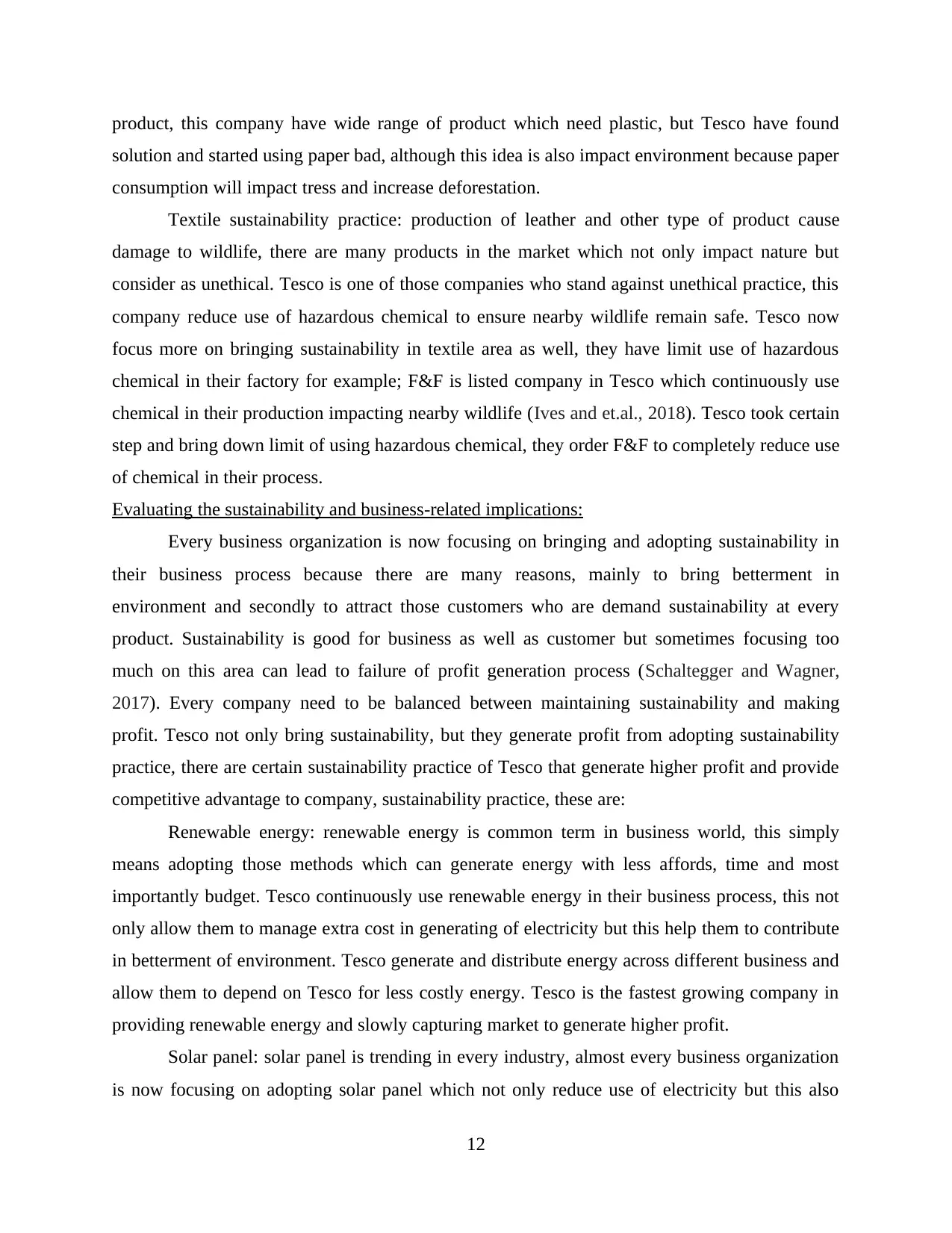
product, this company have wide range of product which need plastic, but Tesco have found
solution and started using paper bad, although this idea is also impact environment because paper
consumption will impact tress and increase deforestation.
Textile sustainability practice: production of leather and other type of product cause
damage to wildlife, there are many products in the market which not only impact nature but
consider as unethical. Tesco is one of those companies who stand against unethical practice, this
company reduce use of hazardous chemical to ensure nearby wildlife remain safe. Tesco now
focus more on bringing sustainability in textile area as well, they have limit use of hazardous
chemical in their factory for example; F&F is listed company in Tesco which continuously use
chemical in their production impacting nearby wildlife (Ives and et.al., 2018). Tesco took certain
step and bring down limit of using hazardous chemical, they order F&F to completely reduce use
of chemical in their process.
Evaluating the sustainability and business-related implications:
Every business organization is now focusing on bringing and adopting sustainability in
their business process because there are many reasons, mainly to bring betterment in
environment and secondly to attract those customers who are demand sustainability at every
product. Sustainability is good for business as well as customer but sometimes focusing too
much on this area can lead to failure of profit generation process (Schaltegger and Wagner,
2017). Every company need to be balanced between maintaining sustainability and making
profit. Tesco not only bring sustainability, but they generate profit from adopting sustainability
practice, there are certain sustainability practice of Tesco that generate higher profit and provide
competitive advantage to company, sustainability practice, these are:
Renewable energy: renewable energy is common term in business world, this simply
means adopting those methods which can generate energy with less affords, time and most
importantly budget. Tesco continuously use renewable energy in their business process, this not
only allow them to manage extra cost in generating of electricity but this help them to contribute
in betterment of environment. Tesco generate and distribute energy across different business and
allow them to depend on Tesco for less costly energy. Tesco is the fastest growing company in
providing renewable energy and slowly capturing market to generate higher profit.
Solar panel: solar panel is trending in every industry, almost every business organization
is now focusing on adopting solar panel which not only reduce use of electricity but this also
12
solution and started using paper bad, although this idea is also impact environment because paper
consumption will impact tress and increase deforestation.
Textile sustainability practice: production of leather and other type of product cause
damage to wildlife, there are many products in the market which not only impact nature but
consider as unethical. Tesco is one of those companies who stand against unethical practice, this
company reduce use of hazardous chemical to ensure nearby wildlife remain safe. Tesco now
focus more on bringing sustainability in textile area as well, they have limit use of hazardous
chemical in their factory for example; F&F is listed company in Tesco which continuously use
chemical in their production impacting nearby wildlife (Ives and et.al., 2018). Tesco took certain
step and bring down limit of using hazardous chemical, they order F&F to completely reduce use
of chemical in their process.
Evaluating the sustainability and business-related implications:
Every business organization is now focusing on bringing and adopting sustainability in
their business process because there are many reasons, mainly to bring betterment in
environment and secondly to attract those customers who are demand sustainability at every
product. Sustainability is good for business as well as customer but sometimes focusing too
much on this area can lead to failure of profit generation process (Schaltegger and Wagner,
2017). Every company need to be balanced between maintaining sustainability and making
profit. Tesco not only bring sustainability, but they generate profit from adopting sustainability
practice, there are certain sustainability practice of Tesco that generate higher profit and provide
competitive advantage to company, sustainability practice, these are:
Renewable energy: renewable energy is common term in business world, this simply
means adopting those methods which can generate energy with less affords, time and most
importantly budget. Tesco continuously use renewable energy in their business process, this not
only allow them to manage extra cost in generating of electricity but this help them to contribute
in betterment of environment. Tesco generate and distribute energy across different business and
allow them to depend on Tesco for less costly energy. Tesco is the fastest growing company in
providing renewable energy and slowly capturing market to generate higher profit.
Solar panel: solar panel is trending in every industry, almost every business organization
is now focusing on adopting solar panel which not only reduce use of electricity but this also
12
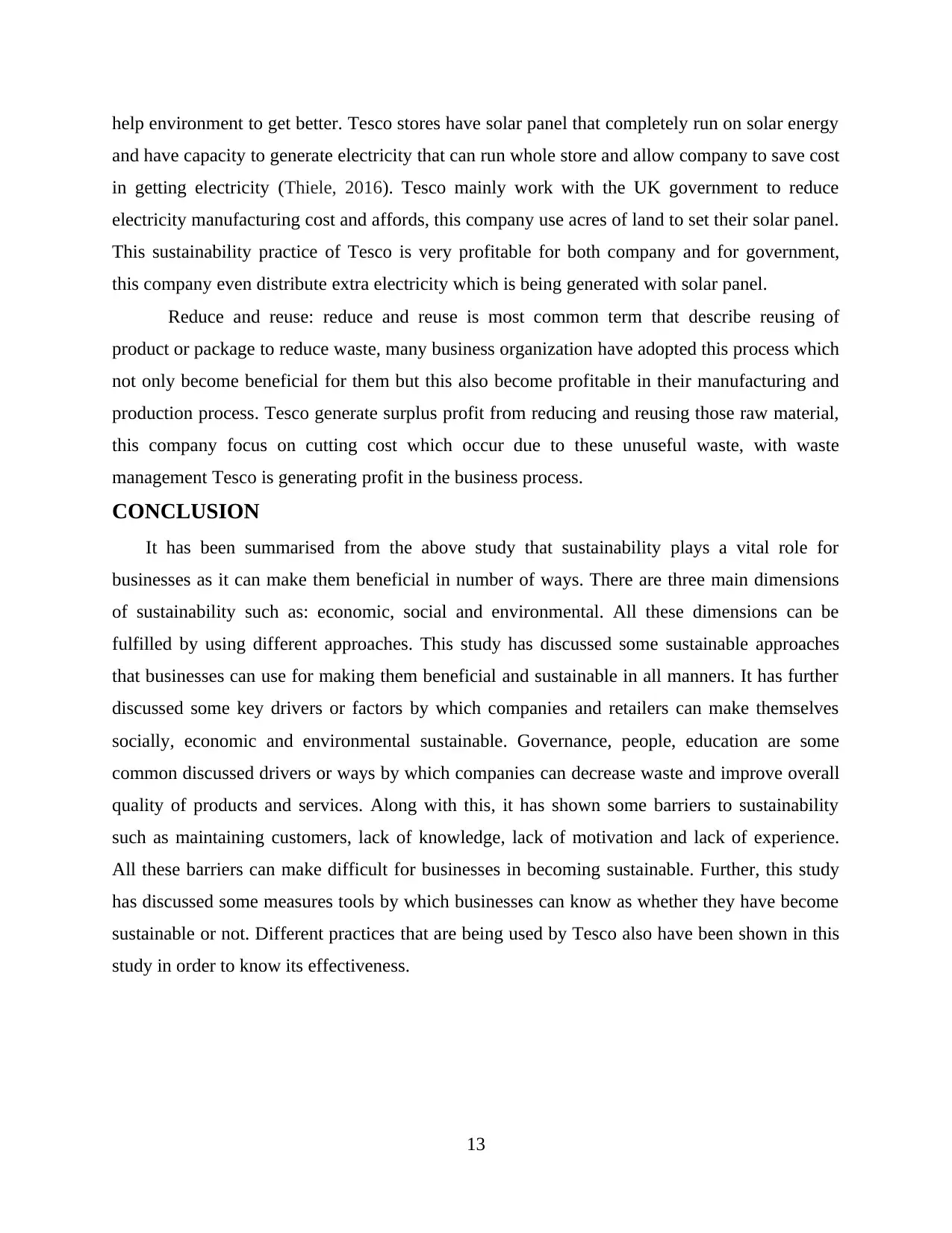
help environment to get better. Tesco stores have solar panel that completely run on solar energy
and have capacity to generate electricity that can run whole store and allow company to save cost
in getting electricity (Thiele, 2016). Tesco mainly work with the UK government to reduce
electricity manufacturing cost and affords, this company use acres of land to set their solar panel.
This sustainability practice of Tesco is very profitable for both company and for government,
this company even distribute extra electricity which is being generated with solar panel.
Reduce and reuse: reduce and reuse is most common term that describe reusing of
product or package to reduce waste, many business organization have adopted this process which
not only become beneficial for them but this also become profitable in their manufacturing and
production process. Tesco generate surplus profit from reducing and reusing those raw material,
this company focus on cutting cost which occur due to these unuseful waste, with waste
management Tesco is generating profit in the business process.
CONCLUSION
It has been summarised from the above study that sustainability plays a vital role for
businesses as it can make them beneficial in number of ways. There are three main dimensions
of sustainability such as: economic, social and environmental. All these dimensions can be
fulfilled by using different approaches. This study has discussed some sustainable approaches
that businesses can use for making them beneficial and sustainable in all manners. It has further
discussed some key drivers or factors by which companies and retailers can make themselves
socially, economic and environmental sustainable. Governance, people, education are some
common discussed drivers or ways by which companies can decrease waste and improve overall
quality of products and services. Along with this, it has shown some barriers to sustainability
such as maintaining customers, lack of knowledge, lack of motivation and lack of experience.
All these barriers can make difficult for businesses in becoming sustainable. Further, this study
has discussed some measures tools by which businesses can know as whether they have become
sustainable or not. Different practices that are being used by Tesco also have been shown in this
study in order to know its effectiveness.
13
and have capacity to generate electricity that can run whole store and allow company to save cost
in getting electricity (Thiele, 2016). Tesco mainly work with the UK government to reduce
electricity manufacturing cost and affords, this company use acres of land to set their solar panel.
This sustainability practice of Tesco is very profitable for both company and for government,
this company even distribute extra electricity which is being generated with solar panel.
Reduce and reuse: reduce and reuse is most common term that describe reusing of
product or package to reduce waste, many business organization have adopted this process which
not only become beneficial for them but this also become profitable in their manufacturing and
production process. Tesco generate surplus profit from reducing and reusing those raw material,
this company focus on cutting cost which occur due to these unuseful waste, with waste
management Tesco is generating profit in the business process.
CONCLUSION
It has been summarised from the above study that sustainability plays a vital role for
businesses as it can make them beneficial in number of ways. There are three main dimensions
of sustainability such as: economic, social and environmental. All these dimensions can be
fulfilled by using different approaches. This study has discussed some sustainable approaches
that businesses can use for making them beneficial and sustainable in all manners. It has further
discussed some key drivers or factors by which companies and retailers can make themselves
socially, economic and environmental sustainable. Governance, people, education are some
common discussed drivers or ways by which companies can decrease waste and improve overall
quality of products and services. Along with this, it has shown some barriers to sustainability
such as maintaining customers, lack of knowledge, lack of motivation and lack of experience.
All these barriers can make difficult for businesses in becoming sustainable. Further, this study
has discussed some measures tools by which businesses can know as whether they have become
sustainable or not. Different practices that are being used by Tesco also have been shown in this
study in order to know its effectiveness.
13
Paraphrase This Document
Need a fresh take? Get an instant paraphrase of this document with our AI Paraphraser
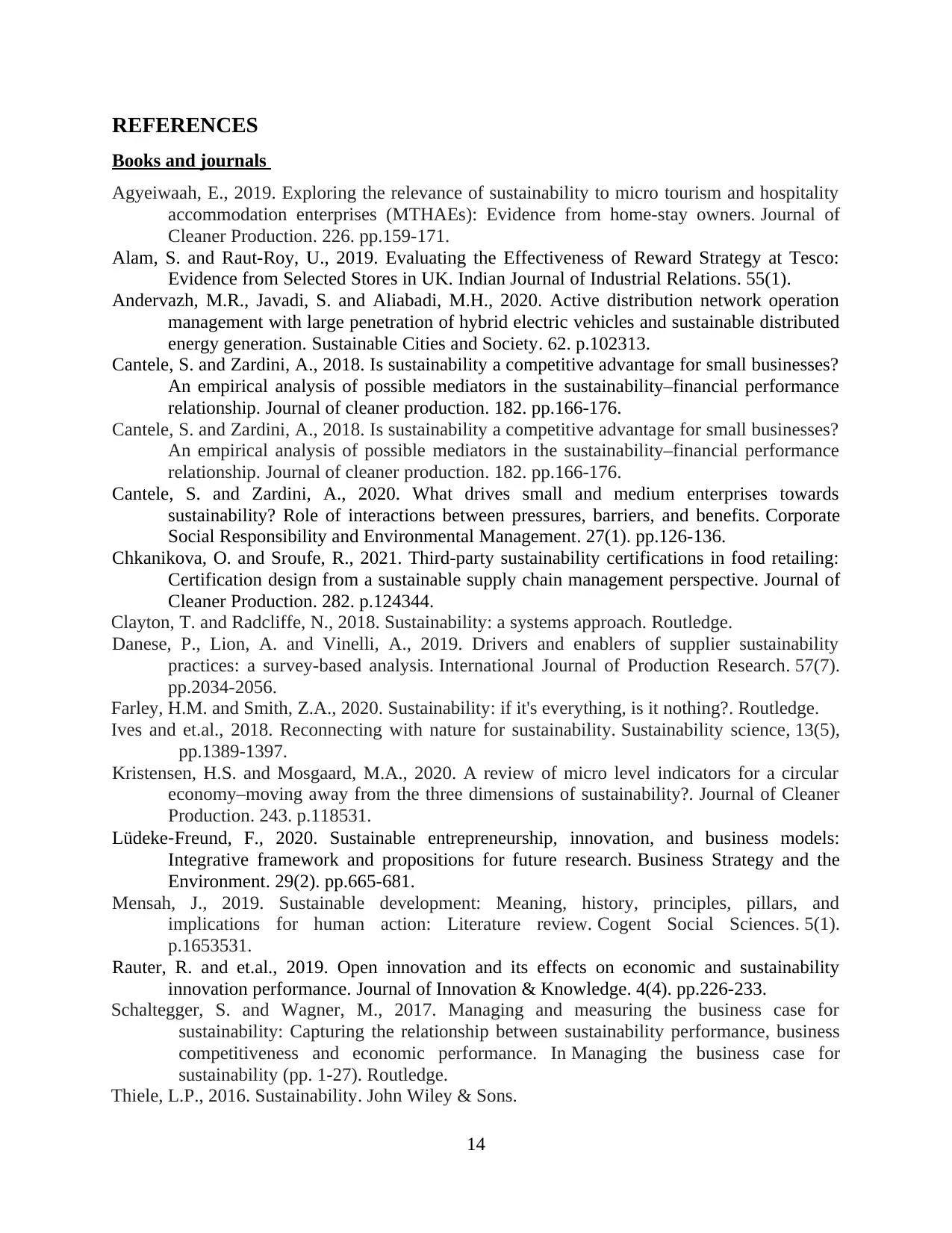
REFERENCES
Books and journals
Agyeiwaah, E., 2019. Exploring the relevance of sustainability to micro tourism and hospitality
accommodation enterprises (MTHAEs): Evidence from home-stay owners. Journal of
Cleaner Production. 226. pp.159-171.
Alam, S. and Raut-Roy, U., 2019. Evaluating the Effectiveness of Reward Strategy at Tesco:
Evidence from Selected Stores in UK. Indian Journal of Industrial Relations. 55(1).
Andervazh, M.R., Javadi, S. and Aliabadi, M.H., 2020. Active distribution network operation
management with large penetration of hybrid electric vehicles and sustainable distributed
energy generation. Sustainable Cities and Society. 62. p.102313.
Cantele, S. and Zardini, A., 2018. Is sustainability a competitive advantage for small businesses?
An empirical analysis of possible mediators in the sustainability–financial performance
relationship. Journal of cleaner production. 182. pp.166-176.
Cantele, S. and Zardini, A., 2018. Is sustainability a competitive advantage for small businesses?
An empirical analysis of possible mediators in the sustainability–financial performance
relationship. Journal of cleaner production. 182. pp.166-176.
Cantele, S. and Zardini, A., 2020. What drives small and medium enterprises towards
sustainability? Role of interactions between pressures, barriers, and benefits. Corporate
Social Responsibility and Environmental Management. 27(1). pp.126-136.
Chkanikova, O. and Sroufe, R., 2021. Third-party sustainability certifications in food retailing:
Certification design from a sustainable supply chain management perspective. Journal of
Cleaner Production. 282. p.124344.
Clayton, T. and Radcliffe, N., 2018. Sustainability: a systems approach. Routledge.
Danese, P., Lion, A. and Vinelli, A., 2019. Drivers and enablers of supplier sustainability
practices: a survey-based analysis. International Journal of Production Research. 57(7).
pp.2034-2056.
Farley, H.M. and Smith, Z.A., 2020. Sustainability: if it's everything, is it nothing?. Routledge.
Ives and et.al., 2018. Reconnecting with nature for sustainability. Sustainability science, 13(5),
pp.1389-1397.
Kristensen, H.S. and Mosgaard, M.A., 2020. A review of micro level indicators for a circular
economy–moving away from the three dimensions of sustainability?. Journal of Cleaner
Production. 243. p.118531.
Lüdeke‐Freund, F., 2020. Sustainable entrepreneurship, innovation, and business models:
Integrative framework and propositions for future research. Business Strategy and the
Environment. 29(2). pp.665-681.
Mensah, J., 2019. Sustainable development: Meaning, history, principles, pillars, and
implications for human action: Literature review. Cogent Social Sciences. 5(1).
p.1653531.
Rauter, R. and et.al., 2019. Open innovation and its effects on economic and sustainability
innovation performance. Journal of Innovation & Knowledge. 4(4). pp.226-233.
Schaltegger, S. and Wagner, M., 2017. Managing and measuring the business case for
sustainability: Capturing the relationship between sustainability performance, business
competitiveness and economic performance. In Managing the business case for
sustainability (pp. 1-27). Routledge.
Thiele, L.P., 2016. Sustainability. John Wiley & Sons.
14
Books and journals
Agyeiwaah, E., 2019. Exploring the relevance of sustainability to micro tourism and hospitality
accommodation enterprises (MTHAEs): Evidence from home-stay owners. Journal of
Cleaner Production. 226. pp.159-171.
Alam, S. and Raut-Roy, U., 2019. Evaluating the Effectiveness of Reward Strategy at Tesco:
Evidence from Selected Stores in UK. Indian Journal of Industrial Relations. 55(1).
Andervazh, M.R., Javadi, S. and Aliabadi, M.H., 2020. Active distribution network operation
management with large penetration of hybrid electric vehicles and sustainable distributed
energy generation. Sustainable Cities and Society. 62. p.102313.
Cantele, S. and Zardini, A., 2018. Is sustainability a competitive advantage for small businesses?
An empirical analysis of possible mediators in the sustainability–financial performance
relationship. Journal of cleaner production. 182. pp.166-176.
Cantele, S. and Zardini, A., 2018. Is sustainability a competitive advantage for small businesses?
An empirical analysis of possible mediators in the sustainability–financial performance
relationship. Journal of cleaner production. 182. pp.166-176.
Cantele, S. and Zardini, A., 2020. What drives small and medium enterprises towards
sustainability? Role of interactions between pressures, barriers, and benefits. Corporate
Social Responsibility and Environmental Management. 27(1). pp.126-136.
Chkanikova, O. and Sroufe, R., 2021. Third-party sustainability certifications in food retailing:
Certification design from a sustainable supply chain management perspective. Journal of
Cleaner Production. 282. p.124344.
Clayton, T. and Radcliffe, N., 2018. Sustainability: a systems approach. Routledge.
Danese, P., Lion, A. and Vinelli, A., 2019. Drivers and enablers of supplier sustainability
practices: a survey-based analysis. International Journal of Production Research. 57(7).
pp.2034-2056.
Farley, H.M. and Smith, Z.A., 2020. Sustainability: if it's everything, is it nothing?. Routledge.
Ives and et.al., 2018. Reconnecting with nature for sustainability. Sustainability science, 13(5),
pp.1389-1397.
Kristensen, H.S. and Mosgaard, M.A., 2020. A review of micro level indicators for a circular
economy–moving away from the three dimensions of sustainability?. Journal of Cleaner
Production. 243. p.118531.
Lüdeke‐Freund, F., 2020. Sustainable entrepreneurship, innovation, and business models:
Integrative framework and propositions for future research. Business Strategy and the
Environment. 29(2). pp.665-681.
Mensah, J., 2019. Sustainable development: Meaning, history, principles, pillars, and
implications for human action: Literature review. Cogent Social Sciences. 5(1).
p.1653531.
Rauter, R. and et.al., 2019. Open innovation and its effects on economic and sustainability
innovation performance. Journal of Innovation & Knowledge. 4(4). pp.226-233.
Schaltegger, S. and Wagner, M., 2017. Managing and measuring the business case for
sustainability: Capturing the relationship between sustainability performance, business
competitiveness and economic performance. In Managing the business case for
sustainability (pp. 1-27). Routledge.
Thiele, L.P., 2016. Sustainability. John Wiley & Sons.
14
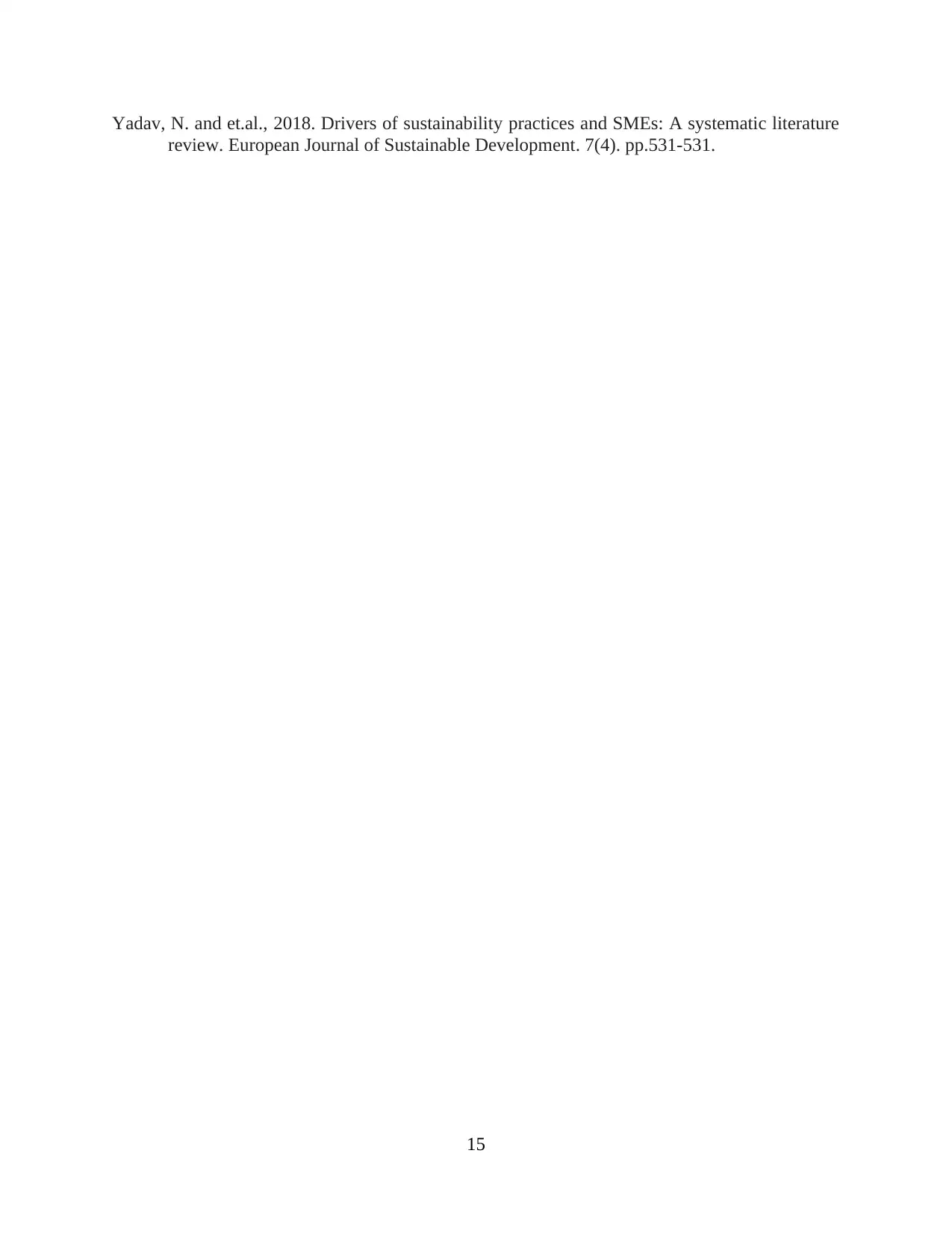
Yadav, N. and et.al., 2018. Drivers of sustainability practices and SMEs: A systematic literature
review. European Journal of Sustainable Development. 7(4). pp.531-531.
15
review. European Journal of Sustainable Development. 7(4). pp.531-531.
15
1 out of 15
Related Documents
Your All-in-One AI-Powered Toolkit for Academic Success.
+13062052269
info@desklib.com
Available 24*7 on WhatsApp / Email
![[object Object]](/_next/static/media/star-bottom.7253800d.svg)
Unlock your academic potential
© 2024 | Zucol Services PVT LTD | All rights reserved.





